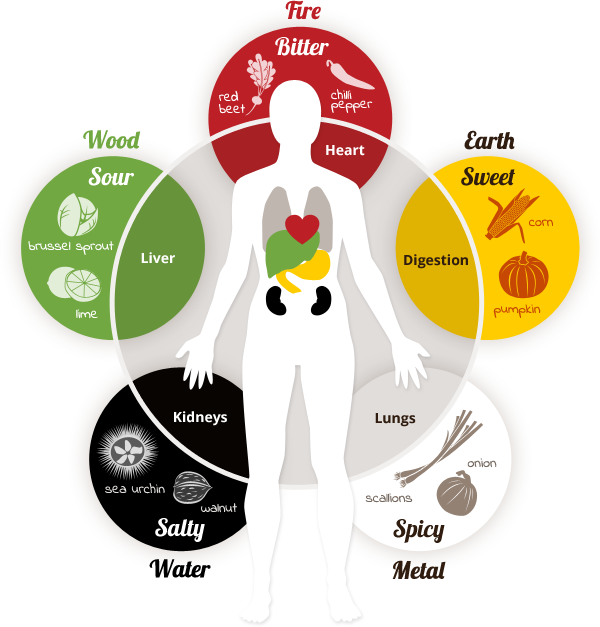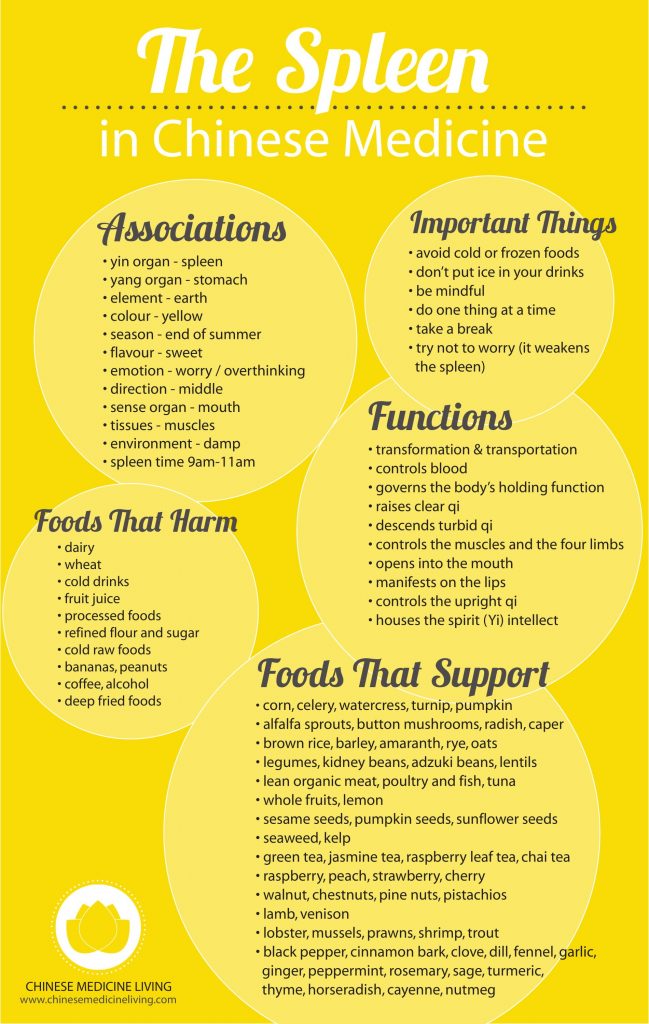By Emma Suttie, D.Ac, AP
The spleen is my favourite organ in the body. As an acupuncturist, I am not really supposed to play favourites, saying you love one organ more than the others is like a parent declaring that they love one of their children more, but I feel like I have a special connection with the spleen. I talk about it a lot and I seem to write about it even more. It is a hard working and often under appreciated little organ, so it is my duty, and my privilege to give it some much needed love and attention.
The spleen is an organ that doesn’t really get discussed very much in relation to the other organs of the body. I think its role in Western medicine is perhaps seen as less ‘vital’ than the other organs, but the role of the spleen in Western medicine is very different than its role in Chinese medicine.
The Spleen In Western Medicine
In Western medicine the spleen is part of the immune system and the largest organ in the lymphatic system. It is where red blood cells are recycled and where white blood cells, called lymphocytes, are stored. It is possible to live without a spleen. You can lacerate or rupture your spleen in a car accident or playing contact sports (or via any severe physical trauma) and the spleen may have to be repaired or removed completely (called a splenectomy). Although it is possible to live without a spleen because other organs overcompensate and take over many of its important functions, it makes a person more susceptible to infections and ultimately compromises their immune system.
The Spleen In Chinese Medicine

The spleen has a fundamental role in Chinese medicine. It, paired with the stomach, are the main organs of digestion and are responsible for digestion and distribution of food and nutrients throughout the body. The spleen extracts qi from the food we eat that is used by the body to build immunity (wei qi), keep things moving freely (stagnation leads to disease), the proper functioning of the other organs and helps to regulate mental functions and emotions.
Why Our Culture Is Hard On The Spleen
It is very common in our culture to have a deficiency of the spleen. Because the spleen is the main organ of not only digestion, but processing, it is responsible for processing the food and drink that we consume, as well as all of the stimulus that comes in through our sense organs. We are a culture that values doing many things at once. The more productive we can be, the more we are praised at our jobs and in life. This philosophy is contrary to the health of the spleen. In Chinese medicine, to keep the spleen healthy, it is important to do one thing at a time, and as mindfully as possible. The idea is that the spleen is then able to use all of its energies to process one thing, rather than having to process many things at once, which wipes out its energy stores, or spleen qi. Examples of doing many things at once are eating (taking in food/drink) while watching TV (taking in stimulus). Or eating while sitting at your computer working. These are commonplace in a culture where everyone has too much to do and is always short on time. This is one of the biggest reasons that so many people suffer with a deficiency of their spleen qi. So, do one thing at a time. If you are going to eat, just eat. Really concentrate and be mindful about what you are doing. Enjoy and savour your food, this will not only help your spleen, but lead you to be more relaxed and help you digest more efficiently too.
A Strong And Balanced Spleen
People with strong and balanced spleen energy have the following characteristics:
- responsible
- practical
- hard working
- strong
- like to nurture themselves and others
- active
- stable
- excellent endurance
- good appetites
- good, healthy digestions
- strong limbs
- are orderly and careful
- often very creative
- have fertile imaginations

A Spleen Imbalance
People with an imbalance of their spleen often display the following characteristics:
- chronically tired
- a feeling of being “stuck” in their lives
- physical and/or mental stagnation
- weak digestion (lots of digestive issues)
- poor appetite
- diminished sense of taste
- loose stools
- abdominal bloating and tenderness
- masses in the abdomen
- weight problems (either overweight without overeating or underweight without the ability to gain)
Spleen Qi Deficiency
A deficiency of spleen qi can be caused by many things. Eating a poor diet of mostly refined, highly processed foods where the body is not receiving enough nourishment is certainly common, especially in industrialized nations where foods tend to be overly processed and many people make poor food choices. Another cause is simply our hectic lifestyles. As I mentioned above, we are a culture of multitasking, and this is particularly hard on the tiny organ that is responsible for doing all the processing. If it is constantly overloaded, then it will become exhausted, leading to spleen qi deficiency. Another cause, and this is also extremely common, is the emotional aspect of the spleen. In Chinese medicine, every organ is associated with an emotion. An excess of that emotion can damage the related organ, and likewise, when the organ is out of balance, it can have a strong effect on the corresponding emotion. The emotion of the spleen in worry/over thinking. If there is one emotion that I see more than any other in clinic, it is WORRY. An excess of worry and over thinking, as well as having a hard time just shutting off your brain, is damaging to the spleen. And we do that so much in our society. The pressures on us are enormous, and people are simply overworked and overstressed. So, poor nutrition, multitasking and a propensity to worry are all part of our culture, and all are affecting our poor, overworked spleens. It’s no wonder spleen qi deficiency is so common.
Here are some symptoms of spleen qi deficiency so you know what to look for:
- weakness of the whole body
- fatigue
- loose stools with undigested food
- a pale tongue with a thin white coat and teeth marks on the sides
- a weak pulse
- weakness of the arms and legs
- weak muscles
- prolapse of organs (such as hemorrhoids, uterus, bladder, intestines)
The symptoms above all point to a spleen imbalance. There is good news though. There is wonderful nutritional therapy for deficient spleen qi, and as many Chinese doctors have known for centuries, food is the best medicine.
The Thermal Nature Of Foods In Chinese Medicine
When we talk about nutritional therapy in Chinese medicine, which is an important modality, we talk about the thermal nature of foods. This can be a bit of a difficult concept to understand at first, but once it’s explained, it actually starts to make a lot of sense. Thermal nature is not just how physically cold or hot a food is as a result of cooking. In Chinese medicine, all foods are seen to have a fundamentally thermal nature, either warming, cooling or neutral, and these are important to know as they have a direct effect on the body. In the context of Chinese medicine it is also important to know the thermal nature of your body, which is measured by the relative yin and yang energies it encompasses. For example, if a person comes to you with a red face, bloodshot eyes, outbursts of anger and is shouting, it is pretty safe to determine that that person has an excess of yang energy and thus, should eat cooling foods and stay away from warming ones until the balance of yin and yang is reestablished. Every organ also, has a temperature that it prefers, so it is good to know all these things when thinking about food therapy in terms of health and disease.
Food Therapy For Spleen Qi Deficiency
With foods thermal nature in mind, the spleen likes to be warm and dry. So if you have spleen qi deficiency, you want to eat foods that are warming, or at least neutral to help build the spleens energy. Cold foods should be avoided as they weaken digestion. Also, foods that are cold in temperature take more energy for the spleen to digest and are seen to extinguish the digestive fire. The flavour associated with the spleen is sweet, so as a rule, sweet foods are prescribed to correct a deficiency.
One of the best foods to build spleen qi is cooked white rice, often eaten in the form of congee or jook. Congee is essentially a porridge made of overcooked rice and water. You may add other ingredients depending on your condition and taste. For spleen qi deficiency or any weakness of the spleen, warming ingredients would be appropriate. See the list below.
Beneficial Spleen Foods
Vegetables
- pumpkin
- yam
- black beans
- garbanzo beans
- carrot
- parsnip
- squash
- peas
- sweet potato
- onion
- leek
Spices
- black pepper
- ginger
- nutmeg
- cinnamon
- fennel
- garlic
Sweeteners (in small amounts)
- barley malt
- rice syrup
- molasses
- cherries
- dates
Animal Products (if the deficiency is severe)
- mackerel
- tuna
- halibut
- anchovy
- beef
- beef liver or kidney
- turkey
- chicken
- lamb
- butter
Chewing foods well is also important when spleen energy is weak. This helps to break down foods before they get to the spleen and means the spleen has less work to do and conserve its energy. Eating things like soups are beneficial because they are cooked until soft and are less work for the spleen to digest. And finally, the preparation of food is also a factor in helping to build up spleen qi. Eating on the run and eating out mean that you are not taking the time and intention to mindfully prepare the foods that you are eating. To prepare foods with care infuses them with healing energies that the whole body, and especially the spleen, needs. So take the time to prepare the foods that you are eating with love, your spleen will appreciate it. 🙂
Re-printed with kind permission of ChineseMedicineLiving.com
Full Article Link = What is Spleen Qi Deficiency? ChineseMedicineLiving
